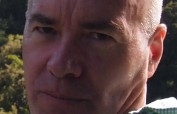An Interview With One Of The Most Influential Teachers At KUST
On February 25th , the Office of Public Affairs sat down with Komar University of Science and technology teacher Geoffrey Mcleod . Below you will find his impressions about teaching, KUST, and life in Sulaimani.
How long have you been at KUST?
A little over a year. I arrived in the middle of December 2013 just as the first module was getting underway.
What was your first impression of Sulaimani?
It was cold when I arrived. I had flown out of New Zealand at the beginning of summer and there was snow on the mountains here at that time. I think my first impression was how easy it was to get through customs and immigration. I don’t really know what I expected but it just seemed easy. Driving from the airport was something of an experience. I am used to it now, but at that time the driving seemed just a little bit crazy – cars and trucks all over the road. My impression of Suli was that it was a pioneer town. There was lots of construction, roads being formed – it looked like it was being rebuilt.
..and your impression of KUST?
It wasn’t quite what I expected.But having said that I am not sure what I expected really. The first thing I noticed of course was that there was nowhere to play rugby. Can’t imagine a university in New Zealand without a rugby field.
You came here to teach so I guess we want to know what you thought of your students when you arrived?
I think I arrived on a Tuesday and I started to teach the following day. It was the MLS class and I have taught them every module right through to graduation. Those students will agree, I am sure that, it wasn’t always easy but we got to the end together and I think we built a pretty special relationship along the way. My other two classes were both Level 1. When people ask me about students, my first response is that it is such a difficult question to answer. I have taught students from 15 different countries, 16 including Kurdistan, and although it is easy to say that Korean students are different from Brazilian students, the one thing I have noticed is that no matter where students come from they are first and foremost students. Students everywhere just seem to have similar characteristics. Although it can be hard to get Korean students to talk, and equally hard to stop Kurdish students from talking too much – in many ways they are the same. I found my Kurdish students to be very outgoing, super friendly and fun to be with. They were not always focused on their studies, but I could say that about all students everywhere. As a teacher you must take your students as you find them.
And what do you think of your students now?
When I spoke to our graduating students last year, I told them that on my first day in class I didn’t imagine that we would all be there together at graduation. On my first day quite frankly, I didn’t think they would make it. I told them I was very pleased to be wrong, and I meant that. I appreciate the difficulties for them of coming into an English immersion environment, and having to leave behind the high school mindset and start to learn in different ways. I appreciate how hard some of them tried. At graduation I said they had earned their success, and that passing level 4 was no simple matter, because for many of them, they had not just passed some exams, but had taken a giant step towards whatever the future might hold for them.
When I see some of them now heading off to their academic classes, especially those who I had to fail at some point, and then see them pass in the end, I feel quite proud. So if you ask me about all those noisy excitable individuals who were any my classes, I guess the only thing I can say is that no matter the distance that might ultimately extend between us, they will always be my students.

